The NBA’s maximum salary is determined by a player’s years of NBA experience. Players with between zero and six seasons under their belts are eligible for a starting salary worth up to 25% of the salary cap. That figure increases to 30% for players with seven to nine years of NBA experience, and to 35% for players with 10+ years of service.
However, there are certain scenarios in which a player can achieve a higher maximum salary than his years of service dictate. When a player who would normally qualify for the 30% max becomes eligible for a starting salary worth up to 35% of the cap before he gains 10+ years of NBA experience, he can sign a Designated Veteran contract, also known as a “super-max” deal.
A player who has seven or eight years of NBA service with one or two years left on his contract becomes eligible for a Designated Veteran contract extension if he meets the required performance criteria. A Designated Veteran contract can also be signed by a player who is a free agent if he has eight or nine years of service and meets the required performance criteria.
However, a player can’t sign a Designated Veteran deal with a new team — only his current team. Additionally, if he has been traded at any time since his first four years in the NBA or previously changed teams via free agency at any point in his career, he becomes ineligible for such a deal.
That means players like Donovan Mitchell, Lauri Markkanen, and Jalen Brunson would have had no path to becoming eligible for Designated Veteran deals with their current teams, but Brandon Ingram (who was traded during his first four seasons) could become eligible if he remains with the Pelicans and meets the performance criteria.
Speaking of that performance criteria, here’s what it looks like. At least one of the following must be a true for a player to be eligible to sign a Designated Veteran contract:
- He was named to an All-NBA team in the most recent season, or in two of the last three seasons.
- He was named NBA MVP in any of the three most recent seasons.
- He was named NBA Defensive Player of the Year in the most recent season, or in two of the last three seasons.
Given the exclusivity of the MVP and Defensive Player of the Year awards, players who qualify for a Designated Veteran contract do so most often by earning All-NBA nods.
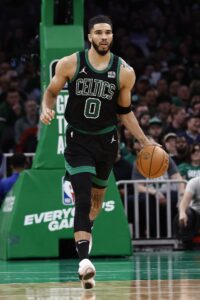 Celtics forward Jayson Tatum was the only player eligible to sign a Designated Veteran contract this offseason. Tatum actually met the performance criteria a year ago by making his second consecutive All-NBA team, but he only had six years of NBA service at the time. He was able to sign his super-max extension this offseason once he registered his seventh year of service.
Celtics forward Jayson Tatum was the only player eligible to sign a Designated Veteran contract this offseason. Tatum actually met the performance criteria a year ago by making his second consecutive All-NBA team, but he only had six years of NBA service at the time. He was able to sign his super-max extension this offseason once he registered his seventh year of service.
Tatum was named an All-NBA first-teamer again in 2024, but would have been eligible even if he’d missed out on an All-NBA spot this year, since his nods in 2022 and 2023 ensured he’d made an All-NBA team in at least two of the past three seasons.
Thunder guard Shai Gilgeous-Alexander and Mavericks guard Luka Doncic are following in Tatum’s footsteps. Both players have made All-NBA teams in each of the past two seasons but still have just six years of service under their belts. They’ll meet the service time criteria next summer and will be eligible to sign Designated Veteran contract extensions in July 2025 whether or not they earn All-NBA honors in 2024/25.
As outlined above, if the Thunder were to trade Gilgeous-Alexander or the Mavericks were to trade Doncic, they would no longer be super-max eligible. But obviously those 2024 MVP finalists aren’t going anywhere in the next year.
While the Designated Veteran rule allows players with fewer than 10 years of NBA experience to qualify for contracts that begin at 35% of the cap instead of 30%, the “Rose Rule” allows players with fewer than seven years of service to qualify for contracts that begin at 30% of the cap instead of 25%.
Those are technically two separate rules, and we’ve discussed the Rose Rule at greater length in a separate glossary entry. However, they’re closely linked, and both types of contracts are sometimes referred to a “super-max” deals.
Here are a few other rules related to Designated Veteran contracts:
- Even if a player qualifies for a Designated Veteran contract, his team isn’t obligated to start its extension offer at 35% of the cap. The player is eligible for a salary up to that amount, but the exact amount is still a matter for the two sides to negotiate. For example, after becoming super-max eligible in 2020, Rudy Gobert signed a contract with the Jazz that began at just over 31% of the cap.
- A Designated Veteran extension can’t exceed six years, including the number of years left on the player’s contract. So if a player signs a Designated Veteran extension when he has two years left on his current contract, he could tack on four new years to that deal.
- A player signing a Designated Veteran contract as a free agent can’t sign for more than five years.
- A Designated Veteran extension can only be signed between the end of the July moratorium and the last day before the start of the regular season.
- If a player signs a Designated Veteran contract, he is ineligible to be traded for one year.
- Under the 2017 Collective Bargaining Agreement, a team wasn’t permitted to carry more than two players on Designated Veteran contracts at a time. However, that rule didn’t carry over to the 2023 CBA and that limit no longer applies.
Our list of the players who have signed Designated Veteran contracts since their inception in 2017 can be found right here.
Note: This is a Hoops Rumors Glossary entry. Our glossary posts will explain specific rules relating to trades, free agency, or other aspects of the NBA’s Collective Bargaining Agreement. Larry Coon’s Salary Cap FAQ was used in the creation of this post.
Previous versions of this glossary entry were published in 2018 and 2023.
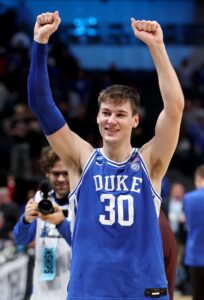 Filipowski, a 7’0″ forward/center, declared for the draft this spring as an early entrant after averaging 16.4 points, 8.3 rebounds, 2.8 assists, and 1.5 blocks in 30.4 minutes per game across 36 starts in his sophomore year at Duke.
Filipowski, a 7’0″ forward/center, declared for the draft this spring as an early entrant after averaging 16.4 points, 8.3 rebounds, 2.8 assists, and 1.5 blocks in 30.4 minutes per game across 36 starts in his sophomore year at Duke. Celtics forward
Celtics forward 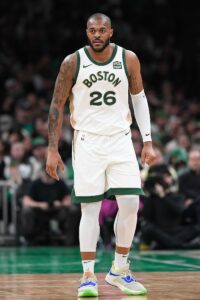
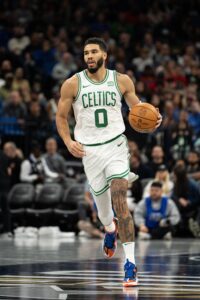 Besides re-signing most of their own free agents, the Celtics agreed to long-term extensions with All-NBA forward
Besides re-signing most of their own free agents, the Celtics agreed to long-term extensions with All-NBA forward 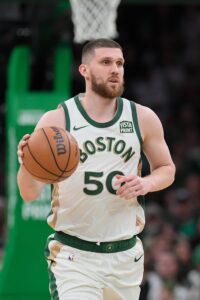 AUGUST 9: The Jazz plan to sign free agent swingman
AUGUST 9: The Jazz plan to sign free agent swingman 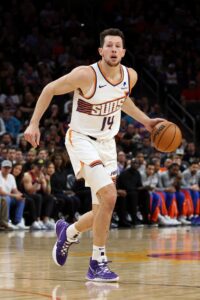 JULY 1: The Jazz will add free agent center
JULY 1: The Jazz will add free agent center 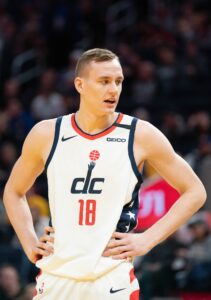 AUGUST 1: The Bucks are signing free agent big man
AUGUST 1: The Bucks are signing free agent big man